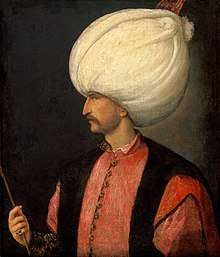Padishah
Padishah ('Master King'; from Persian: pād [or Old Persian: pati], 'master', and shāh, 'king'),[1] sometimes rendered as Padeshah or Padshah (Persian: پادشاه; Ottoman Turkish: پادشاه, pâdişah; Turkish: padişah), is a superlative sovereign title of Persian origin.
It was adopted by several monarchs claiming the highest rank, roughly equivalent to the ancient Persian notion of "The Great" or "Great King", and later adopted by post-Achaemenid and Christian Emperors.
Historical usage
The rulers on the following thrones – the first two effectively commanding major West Asian empires – were styled Padishah:
- The Shāhanshāh of Iran (King of Kings of Persia), of Achaemenid or Sassanid origin
- The Sultan of the Ottoman Empire
- The Badshah of the Mughal Empire
- Miangul Golshahzada Abdul Wadud (predecessor styled Amir-i shariat, successors [Khān and] Wali) of the Pakistani North West Frontier state of Swat, who called himself badshah from November 1918 to March 1926.
- Ahmed Shah Durrani, who founded the Durrani Empire in 1747 with the title Pādshah-i Afghanistan in Persian and Badcha Da Afghanistan in the Pashto language. The Sadduzai were overthrown in 1823 but there was a brief restoration by Shah Shujah in 1839 with the help of British India & Ranjit Singh and the Sikh Empire. The title became dormant from his assassination in 1842 until 1926 when Amanullah Khan resurrected it (official from 1937) and was finally laid to rest with the abdication of Mohammed Zahir Shah in 1973 following a coup; at other times the Afghan monarchy used the style Emir (Amir al-Momenin) or Malik ("King").[2]
- The last Basha bey of Tunisia, Muhammad VIII al-Amin (proclaimed bey on 15 May 1943), adopted the sovereign style padshah 20 March 1956 – 25 July 1957.

The paramount prestige of the title padishah in Islam and beyond becomes clearly apparent from the Ottoman Empire's dealings with the (predominantly Christian) European powers. For example, one of the terms of the Treaty of Küçük Kaynarca in 1774 was that the defeated Ottoman Empire refer to Empress Catherine the Great of Russia, and all other Russian monarchs after her, as a "Padishah" in all official correspondence (including in the treaty itself). This was a symbolic acknowledgement that Christian emperors were in all diplomatic and corollary capacities the equal of the Turkish ruler, who by his religious paramount office in Islam (Caliph) had a theoretical claim of universal sovereignty (at least among Sunnites).
The compound Pādshah-i-Ghazi ("Victorious Emperor") is only recorded for two individual rulers:
- Ahmad Shah Durrani, Emperoror of the Durrani Empire (r. 1747–1772)
- H.H. Rustam-i-Dauran, Aristu-i-Zaman, Asaf Jah IV, Muzaffar ul-Mamaluk, Nizam ul-Mulk, Nizam ud-Daula, Nawab Mir Farkhunda 'Ali Khan Bahadur [Gufran Manzil], Sipah Salar, Fath Jang, Ayn waffadar Fidvi-i-Senliena, Iqtidar-i-Kishwarsitan Muhammad Akbar Shah Padshah-i-Ghazi, Nizam of Hyderabad (r. 1829–1857)
Note that like many titles, the word Padishah was also often used as a name, either by nobles with other (in this case always lower) styles, or even by commoners.
Modern usage
There is a large family of Turkish origin using the surname Badi in modern-day Libya. They were originally called "Padishah" due to their Military rank in the Ottoman Army, but the part "shah" was dropped after the Ottoman landing in the North East Libyan town of Misrata, and the pronunciation of "Padi" became "Badi" from the Arabic pronunciation, as there is no p in Arabic.
In 2008, a professional cricket team, the Lahore Badshahs, was founded.
In India, Padishah is often a Muslim surname, from the above-mentioned trend of adopting titles as names by both royalty and commoners.
In popular culture
In Frank Herbert's 1965 novel Dune, the titular head of human space is styled "Padishah Emperor of the Known Universe". In the Pathfinder role-playing game, the ruler of the Empire of Kelesh is styled "Padishah Emperor".
References
- Etymonline.com, s.v. "pasha" Archived 2013-10-06 at the Wayback Machine.
- "Countries Ab-Am". rulers.org.
.svg.png)